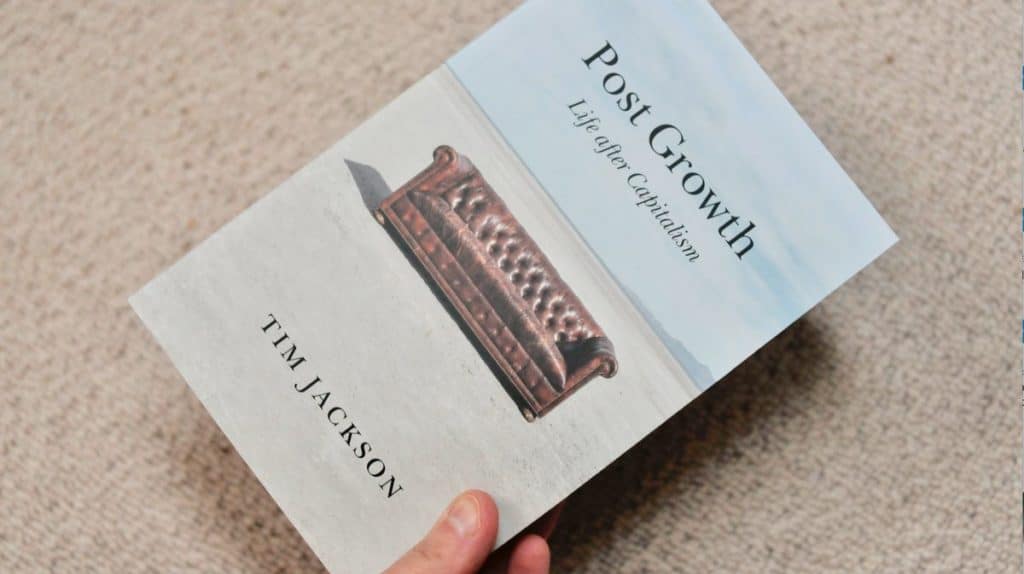There is no growth on a dead planet. In his 2021 book, Post Growth: Life after Capitalism, Tim Jackson reflects on the existential risks that humanity faces today and offers a revolutionary perspective of what the future could look like if society ended its obsession with constant economic growth and GDP. He balances negativity and optimism: he draws our attention to the immense social and environmental dangers looming over us, but also to the opportunities that await us in a world where the definitions of progress are reevaluated. The objective of this book is to debunk the “myth of growth”. Most eloquently summed up by the Chinese philosopher Lao Tzu, Jackson stresses the imperative of understanding “that enough’s enough is enough to know”.
—
We live on a finite planet. Earth is being altered by the relentless expansion of human activity that “parades under the seductive banner of progress”. The environment is key to a healthy society and Jackson reminds us that fulfilment isn’t just driven by the accumulation of material wealth. Our economic progress is wreaking potentially irreversible havoc on the natural world.
At the centre of this book is the conviction that human prosperity does not need to be linked to climate degradation. However, this requires redefining what it means for a society to be prosperous. GDP as a measure of living standards is fundamentally flawed regardless of the fact that a more efficient option doesn’t currently exist, and a perennial focus on GDP and economic growth has become a hallmark of our times. Material progress has improved our lives drastically, but where does it stop?
Jackson has a sinuous but clear-eyed vision of the conditions that society really thrives under, and it is not one where progress is defined by GDP and economic growth. He seeks out ways to maximise humanity’s potential so that each of us can live more fulfilling and sustainable lives. There is a value in realising that “this threat, climate change, exists and that we may be sleepwalking into danger. But thinking about the world and society we want to create and rethinking what it is we mean by progress is just as important” as Tim told us during a recent interview with Earth.Org.
Post Growth doesn’t always offer practical solutions to the imminent issues that we are encountering, but Jackson is very clear that “if we want to address these huge challenges we now face, then we have to begin rethinking our political processes”. His book is an urgent appeal to politicians and economists to understand that the economy is not separate from the natural world, but a “wholly owned subsidiary of the environment,’ and constant economic growth is not compatible with this world.
Our secular structures are dominated by short-termism and we are trapped in an “iron cage of consumerism,” as Jackson calls it, which keeps us focused on the supposed virtue of GDP and constant economic growth. It is imperative that we shift towards valuing durability and creativity much more highly – Jackson states that the creativity in our souls is the key to break free from this cage and to live more meaningful lives.
Our planet has constraints and the economy needs to reflect that, but as Jackson pointedly says, “limits are the gateway to the limitless.” Beyond our material constraints lies an affluence worth reaching, a destination where real prosperity reigns above all else. We need to adapt in order to negotiate between the limited and the limitless. Only then, can we find a destination worth living in.
Much of Post Growth is inspirational, because as Jackson reminded us in our interview, “human potential is dramatically under explored, and that is an exciting place to be”. Neither Tim Jackson nor his book pretend to have all the answers, but what Post Growth lacks in concrete policy solutions it makes up for in helping readers envision and chart a path past our present of unending economic and GDP growth, and past even our possibly inevitable future – “another better world is possible”.
Perhaps what makes this book so intriguing is Jackson’s ability to draw on endless sources. From Shakespeare, to Robert F. Kennedy, to Aristotle – the author poetically analyses what really makes life worth living. Jackson is a polymath, trying to spark a new post growth era, a new tomorrow with reconsidered values, a new Renaissance. Tim Jackson’s book is an invitation to learn from history. It is an unapologetic analysis of his vision for a post-growth world.
For more, watch Tim speak with Earth.Org founder Constant Tedder in a fascinating 60-minute conversation here.
Post Growth: Life after Capitalism
Tim Jackson
2021, Polity, 256pp

















